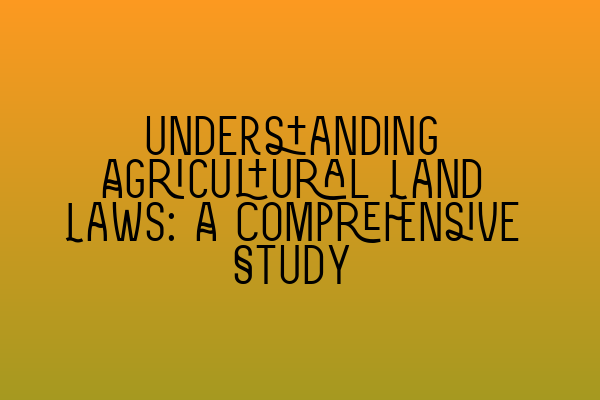Understanding Agricultural Land Laws: A Comprehensive Study
As a land law solicitor at SQE Property Law & Land Law, I am frequently asked about the intricacies of agricultural land laws. Agricultural land plays a crucial role in the economy and food production of any country, and therefore, it is subject to specific regulations and laws. In this comprehensive study, we will explore the various aspects of agricultural land laws, aiming to provide you with a deep understanding of this complex area.
1. Introduction to Agricultural Land Laws
Agricultural land laws are a subset of land laws that specifically deal with the ownership, use, and regulation of land for agricultural purposes. These laws are implemented to ensure the sustainable use of agricultural land, protect the rights of farmers and landowners, and promote the efficient functioning of the agricultural sector.
2. Agricultural Tenancies Act 1995
One key piece of legislation that governs agricultural land in England and Wales is the Agricultural Tenancies Act 1995. This Act sets out the legal framework for agricultural tenancies, including the rights and obligations of both landlords and tenants. It also covers important topics such as rent reviews, succession rights, and termination of tenancies.
To better understand the Agricultural Tenancies Act 1995, you may find it useful to refer to our related article: SRA SQE Exam Dates.
3. Planning Permission and Agricultural Land
When it comes to using agricultural land for non-agricultural purposes, obtaining planning permission is often necessary. Local authorities have the power to grant planning permission for development on agricultural land, but there are restrictions in place to protect the agricultural use of the land. Understanding the relevant planning laws and procedures is crucial for any landowner or developer considering such a change of use.
4. Environmental Regulations and Agricultural Land
Protecting the environment is a key consideration when it comes to agricultural land laws. Farms and agricultural activities can have significant impacts on the environment, such as pollution of water sources or destruction of natural habitats. As a result, there are various environmental regulations and guidelines in place to ensure that agricultural practices are sustainable and environmentally friendly.
Our related article on SQE 1 Preparation Courses can provide you further insight into the regulations and guidelines in this area: SQE 1 Preparation Courses.
5. Succession Rights and Agricultural Land
Succession rights in relation to agricultural land are of utmost importance for farmers and landowners. The Agricultural Holdings Act 1986 sets out the regulations surrounding the succession of agricultural tenancies. It provides protection to farm tenants who have invested their time and resources into the land, granting them the right to pass on the tenancy to family members or successors in certain circumstances.
For a deeper understanding of the regulations surrounding succession rights, we recommend checking out our related article on SQE 1 Practice Exam Questions: SQE 1 Practice Exam Questions.
6. Common Agricultural Policy (CAP)
In the European Union, the Common Agricultural Policy (CAP) has a significant influence on agricultural land laws. CAP aims to support farmers, promote sustainable farming practices, and ensure food security. It provides subsidies, grants, and support schemes to farmers, which can have implications for landowners and agricultural businesses.
To gain a deeper understanding of the Common Agricultural Policy and its impact on agricultural land laws, please refer to our related article: SQE 2 Preparation Courses.
In conclusion, understanding agricultural land laws is essential for landowners, farmers, and anyone involved in the agricultural sector. This comprehensive study has provided an overview of key areas such as agricultural tenancies, planning permission, environmental regulations, succession rights, and the Common Agricultural Policy. By familiarizing yourself with these laws, you can ensure compliance and protect your interests in the ever-changing landscape of agricultural land.
If you’re preparing for the SQE exams, don’t forget to check out our related articles for insightful exam preparation resources: SQE 1 Practice Mocks FLK1 FLK2 and SQE 2 Preparation Courses.
At SQE Property Law & Land Law, we are committed to providing exceptional legal services and expert advice in all matters related to property and land law. If you have any questions or require professional assistance, do not hesitate to get in touch with our experienced team of solicitors.
